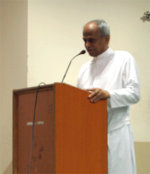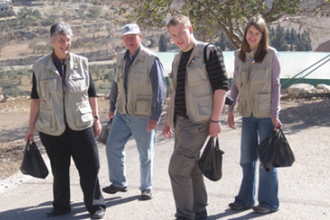Jesuit priest calls for halt to India's nuclear programme

Dr Ambrose Pinto SJ image: St Joseph's College
A Jesuit priest in Indian has called for an end to the country's nuclear programme. "With less than half of the billions that are expected to be spent on nuclear energy it might be possible to deliver electricity in every city and every house in India," Father Ambrose Pinto told the Missionary News Service.
Father Pinto who has recently taken over the leadership of Saint Joseph's University College in Bangalore said that the institute is soon to be powered exclusively by solar energy - and he said he believes it should be possible to develop alternative forms of energy across India at half the cost the country is planning to spend on developing nuclear power through a new agreement with the US. According to the New York Times, the agreement is worth some150 billion US dollars.
Fr Pinto said: "India has adopted a sole development model, the capitalist and neo-liberal one. But it's a mistaken model, especially in this country, where different peoples and communities live together and where there is the risk of suffocating a pluralist society. The accord with the US will end up enriching foreign multinationals, who place their interests ahead of the needs of the local economy and development".
He said: "India has 1.2 billion inhabitants and it is a great opportunity for multinationals. But the reality is that wherever nuclear power stations have been planned, or where construction began, there have been protests, almost always led by native communities. The police has had to intervene forcefully and it was only possible to go head with repression.
"That the accord with the USA is contested, is already evident by the ways in which it is being ratified in parliament. The 'Wikileaks'cables have confirmed that some opposition MP's have been bribed. And it is understood, why the accord subordinates India's interests to those of the United States. The agreement has had repercussions on relations with Iran and more generally hurt the non-aligned movement, that was the main point of reference for our diplomacy for a long time".
Today in India there are 19 nuclear power stations. The first nuclear weapon test there took place in 1974.
Fr Pinto warned of the dangers of the nuclear industry. He said that 13 years after nuclear experiments in Pokhran in 1998, about 150 km. from the Pakistani border, " the land is still a desert where farmers have no land to farm, nor forests nor anything."
"They are paying for the arrogance of a country that spends billions on nuclear energy, forgetting about the 60% of the population that lives below the poverty line. The government says that atomic energy is necessary to satisfy the national energy supply needs - but in some villages of the State of Jharkhand, children are born with disabilities and illness because of the open air uranium mines and the radio-active waste in open air discharges…"
Fr Pinto said the recent nuclear accident in Fukushima showed that "even the most advanced countries" are at risk.
He added: "Then there is the issue of stockpiles. The arms race has terrified the Indians and the Pakistanis, our supposed enemies."
In just two weeks from arriving in his new post, Fr Pinot has overseen the installation of solar panels which will provide enough power for all the students' activities, in the classrooms, libraries, and laboratories at St Joseph's College.
He said he believes if the Indian government wanted to, they could do much more to introduce safe and clean sources of energy across the country. "We have enough natural resources" he said. "What we need is the will to use them."
Source: MISNA















